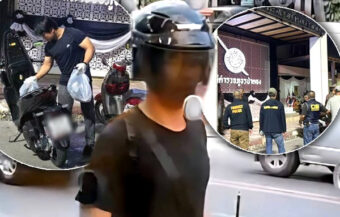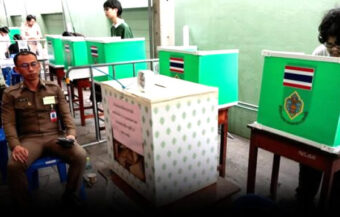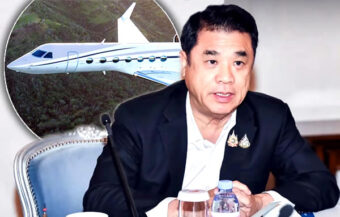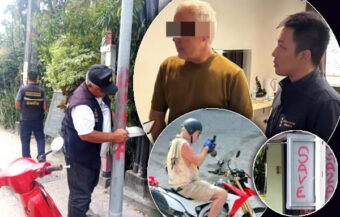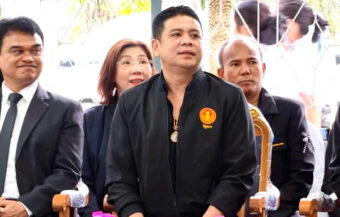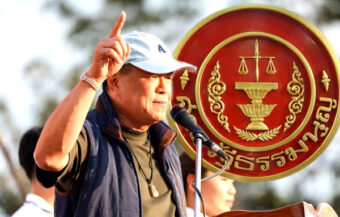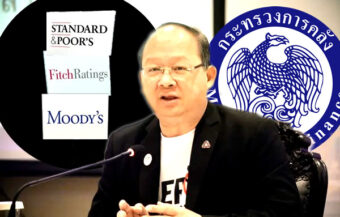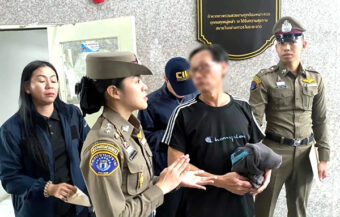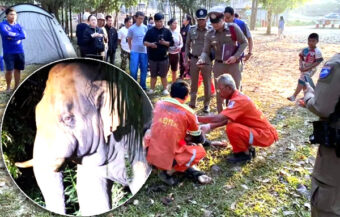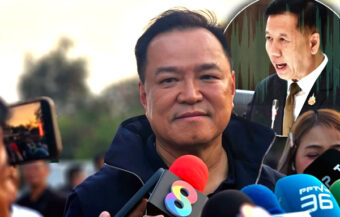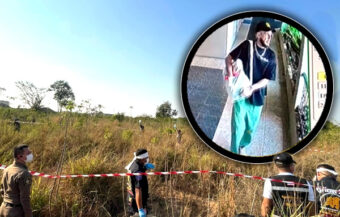Thailand’s new 36-member cabinet has secured royal approval and will be sworn in on Wednesday at Dusit Palace, after previous uncertainty over key appointments, political tensions and concerns about the Prime Minister’s expanded influence in parliament.
Prime Minister Anutin Charnvirakul’s cabinet has secured Royal approval and will be sworn in on Wednesday evening at Bangkok’s Dusit Palace. The confirmation came Friday, putting to rest swirling rumours of last-minute objections. Despite intense speculation midweek, the final list remained unchanged from the version submitted Tuesday night and confirmed Wednesday morning.
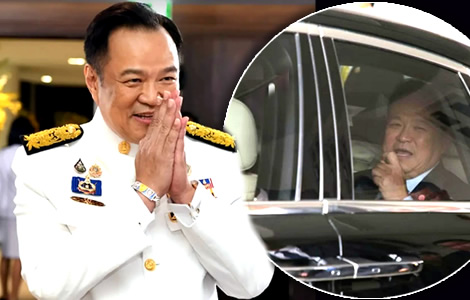
On Friday, Thailand officially entered a new political chapter. The Royal Gazette published the royal endorsement of Prime Minister Anutin Charnvirakul’s 36-member cabinet. This announcement followed days of mounting political speculation and swirling rumours.
Earlier in the week, several ministerial picks were reportedly flagged by the Privy Council. Some faced ethical questions. Others were rumoured to be facing last-minute objections. However, in the end, the list remained unchanged. All nominated ministers were approved without alteration.
Anutin’s government is now on track to assume full power. The entire cabinet will take the oath of office before Their Majesties the King and Queen on Wednesday, September 24, at 6:00 PM. The ceremony will be held at the historic Amphorn Sathan Throne Hall inside Bangkok’s Dusit Palace.
Ministers to gather for photos and tests before the first cabinet meeting and press event at Government House
Before that, the new ministers will gather at Government House at 2:00 PM. Each will pose for official ID photos in the Yellow Room of the Santi Maitri Building. This will be followed by COVID-19 antigen tests in the Blue Room. At 3:30 PM, they will assemble for a group photo.
By 4:00 PM, the cabinet will leave Government House for Dusit Palace. After the oath, a special cabinet meeting will be convened. Then, Prime Minister Anutin will lead the ministers to the Phakdi Bodin Building for their first press conference. There, they will announce the new government’s official policy agenda.
Notably, the House of Representatives is expected to schedule the parliamentary session for the official policy statement within days. Until that happens, the government cannot begin its full legislative duties. Therefore, this presentation is a critical step.
The cabinet line-up includes several key appointments. Anutin himself will also serve as Interior Minister. Finance will be handled by Ekniti Nitithanprapas. Suphajee Suthumpun becomes Minister of Commerce. Foreign Affairs goes to Sirasak Phuangketkeow. The Energy portfolio is assigned to Auttapol Rerkpiboon. Pipat Ratchakitprakan will serve as Transport Minister.
Military and civilian balance in the cabinet as Anutin confirmed after court removed two ex-prime ministers
Legal expert Borwornsak Uwanno will serve as one of the Deputy Prime Ministers. Meanwhile, Gen Nattaphon Narkphanit becomes Minister of Defence, backed by Lt Gen Adul Boonthamchareon as his deputy. This is seen as a balancing act between civilian and military interests.
On September 5, Anutin was confirmed as Thailand’s 32nd Prime Minister. His appointment came after the Constitutional Court dismissed former Prime Minister Paetongtarn Shinawatra on August 29 and Srettha Thavisin, just over a year previously. The dismissals were based on ethical violations, including attempted appointments of unqualified ministers.
Importantly, Anutin’s Bhumjaithai Party now leads a minority government. The opposition People’s Party, which holds 143 seats, has agreed to support his leadership. However, the support comes with strict conditions. Chief among them: dissolve the House within four months of presenting a policy statement.
If this condition is met, fresh elections are expected in February or March. Otherwise, the fragile alliance may collapse. Therefore, the stakes are high from the outset.
Critics from Pheu Thai attack Anutin’s line-up and accuse the opposition of enabling ‘Buriram model’ rule
Despite the formal approval, criticism has already begun. On Friday, senior Pheu Thai figures launched strong verbal attacks. Former Acting Prime Minister Phumtham Wechayachai and outgoing government spokesman Jirayu Huangsap were among the most vocal critics.
Mr. Jirayu vowed to file requests under the Information Act. His aim is to expose ethical issues within the cabinet. Meanwhile, Phumtham branded the line-up the “Buriram model,” referencing Bhumjaithai’s power base in Buriram province. He also accused the People’s Party of enabling Anutin’s rise.
They argued that this new government must take full responsibility for its own decisions. According to Phumtham, it cannot shift blame later. He warned that public trust is already hanging by a thread.
One appointment, in particular, has sparked intense controversy—Captain Thamanat Prompow. He has been named Deputy Prime Minister and Minister of Agriculture. However, his criminal past in Australia remains a political lightning rod.
Captain Thamanat Prompow’s controversial appointment raises concerns that PM Antin may be challenged
Thamanat was convicted of drug trafficking in Australia and served time in prison. Despite this, he later returned and entered Thai politics. Although the Constitutional Court previously cleared him to serve, public scepticism remains high.
Critics argue that appointing him undermines the integrity of the entire government. His inclusion also highlights inconsistencies. Former Prime Ministers Srettha and Paetongtarn were removed on ethical grounds. Yet Thamanat now holds one of the top jobs as Minister of Agriculture and will serve as a deputy prime minister.
Previously, Thamanat was excluded from the second Pheu Thai-led cabinet. At the time, ethical standards were used to block his return. That same logic is now being ignored. This has raised serious concerns among legal observers and democracy advocates alike.
Nonetheless, Anutin appears unfazed by the controversy. He has pledged to focus on reducing household debt and lowering the cost of living. He also plans to stabilise the Thai baht, which has risen sharply. A stronger baht could hurt exports and tourism—two vital sectors for Thailand’s economy.
Government House is fully prepared for the new cabinet with traditional rituals and security updates
At Government House, preparations are now complete. Staff have worked throughout the week to ready the Thai Khu Fa Building and the surrounding areas. Cleaning crews scrubbed stairs and floors. Gardeners trimmed trees and manicured lawns. Even spiritual rituals were performed.
On Thursday night, Minister to the Prime Minister’s Office Santi Piyatat brought a fortune teller to bless his new office. This act reflects the mixing of tradition and superstition with politics in Thai governance.
Meanwhile, parking signs have been installed for Anutin and his deputy ministers. Offices for the Ministers of the Prime Minister’s Office have been thoroughly inspected. Security protocols have also been updated.
Every detail suggests a government preparing to hit the ground running. Yet tensions simmer beneath the surface. Opposition leaders are already questioning the cabinet’s legitimacy. Civil society groups are expected to monitor the administration closely.
The press is also watching. Every appointment, statement, and policy will be dissected. With elections potentially looming in early 2026, time is limited. Anutin must deliver results quickly—or face the consequences.
Anutin faces immediate tests as a new Prime Minister with the People’s Party’s trust and an election deadline
At 59, Anutin has waited a long time for this role. Now, his leadership will be tested from day one. The honeymoon, if there ever was one, is already over.
For now, the machinery of state is turning once again. The buildings are ready. The officials are in place. The press cameras are rolling. On September 24, Thailand will watch as a new government takes its oath—and steps into the political spotlight.
Yet questions remain. Can this government endure? Will it meet its promises? And can it restore public trust? These answers will define the legacy of Anutin’s first—and possibly only—term as Prime Minister.
For the People’s Party, the fear is that the new Prime Minister will backtrack on the Memorandum of Understanding (MOU) with the opposition party. The MOU calls for a General Election within four months of the policy statement.
In addition, it calls for the process of drafting a new constitution to be put in place. This would start with parts 1 and 2 of three questions needing to be put to the people in one vote. This would happen at the same time as the General Election poll.
Anutin is expanding his political network while Bhumjaithai blocked past constitutional change efforts
For instance, a political analyst has noted that Prime Minister Anutin is already expanding his political network. The theory is that he will try to build a majority in parliament.
In the meantime, there have already been signs of a lack of interest by the Bhumjaithai Party in constitutional change matters. Representatives from the party, for instance, this week failed to attend a parliamentary committee meeting. Even if a referendum is agreed between the parties to take place at the same time as the General Election, there are considerable differences of interpretation as to what should be the nature and substance of any revised constitution.
Crisis: Anutin’s cabinet picks are reportedly in difficulty after an initial review by the Privy Council
Meanwhile, political commentators think it may not take long before a Constitutional Court petition is filed against the Prime Minister linked to his cabinet picks. That could conceivably lead the new PM to dissolve parliament before even a provisional ruling from the court, which may suspend him from duty.
Join the Thai News forum, follow Thai Examiner on Facebook here
Receive all our stories as they come out on Telegram here
Follow Thai Examiner here
Further reading:
Anutin planning eight-month economic programme as his PM tenure will extend to the next government
2nd Army chief warns Acting PM Cambodian regime cannot be trusted and that border must stay closed


